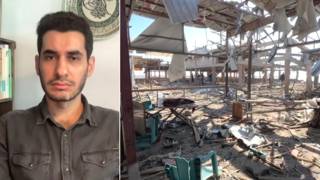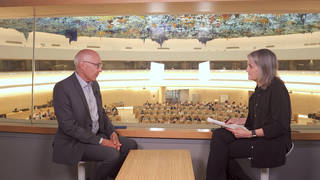
Topics
Indonesian President B.J. Habibie said this week that he wants East Timor to decide on the question of autonomy before national elections on June 7–this according to Australian foreign minister Alexander Downer. Downer said that an “autonomy package” could be finalized during the next round of U.N.-sponsored talks on East Timor between Indonesia, Portugal and the East Timorese this upcoming March 7th to 9th. [includes rush transcript]
Journalist and human rights activist Allan Nairn and Amy Goodman interviewed East Timorese resistance leader Xanana Gusmao early this morning. Gusmao was moved from an Indonesian prison to house arrest in Jakarta this past month, after Indonesia announced a reversal in its policy towards East Timor, and said that it would consider granting independence to the occupied territory.
Guest:
- Xanana Gusmao, resistance leader from East Timor. Speaking from Jakarta, where he is under house arrest.
Related link:
Transcript
Juan Gonzalez: We are joined now by journalist and human rights activist Allan Nairn, who with Amy Goodman interviewed East Timorese resistance leader Xanana Gusmao early this morning. Gusmao was moved from an Indonesian prison to house arrest in Jakarta this past month, after Indonesia announced a reversal in its policy towards East Timor, and said that it would consider granting independence to the occupied territory. Welcome Allan, and could you tell us a little something about the interview we’re about to hear?
Allan Nairn: Thanks. This was taped at 3:30 this morning by phone with Xanana under house arrest and a phone hook-up with Amy in Peru. This is the first US radio interview with Xanana. For years he was in the hills, then recently he was taken out of the main prison. There’s a few terms he uses in the interview that I just wanted to explain to listeners. He refers to the SGI, which is the Indonesian military intelligence, the ABRI, that’s the Indonesian armed forces, Falintil, those are the Timorese guerrillas that Xanana leads as well as leading the CRNT, which is the political umbrella group there. He refers to the “consultation process”—that’s the process by which the Timorese will decide if they want autonomy as part of Indonesia or whether they want independence.
Amy Goodman: You are listening to Pacifica Radio’s Democracy Now. I’m Amy Goodman in Lima, Peru and I’m joined by freelance journalist Allan Nairn in the studios in New York. Today we’re going to be interviewing the rebel leader of East Timor, Xanana Gusmao, who is joining us from the Indonesian capital of Jakarta, where he is under house arrest. Allan Nairn and I went to East Timor in 1990, 1991 and 1994. Until 1992, Xanana Gusmao lived in the mountains of East Timor, fighting the Indonesian army, which had occupied the small island country since 1975. In 1992, the Indonesian army captured Xanana Gusmao [and] sentenced him to life in prison, a term which was later commuted to twenty years. Then a few months ago, the Indonesian regime that it would grant East Timor autonomy, and if the Timorese didn’t accept that, it might grant them independence. Well, a few weeks ago, Xanana Gusmao was moved from prison to house arrest. Xanana is a Nelson Mandela-like figure in East Timor. World leaders have called for his full release. In the meantime, he’s meeting with leaders around the world; on Friday, March 5th, he will meet with Secretary of State Madeline Albright. Xanana Gusmao, this is your first US radio interview. We welcome you to Democracy Now. Xanana Gusmao:
Xanana Gusmao: I’m happy, very happy and grateful to speak on radio, to get this opportunity to talk to everybody about the East Timorese problem. On behalf of my people I would like to thank Allan Nairn and Amy Goodman and all people who brought to the international community the reality of East Timor. I thank you, I thank you very much my friends.
Allan Nairn: Can you tell us who has created these militia groups, these paramilitaries that are now attacking civilians in East Timor?
Xanana Gusmao: We have concluded that it is [Indonesian] military intelligence. They organized the civilians and they gave them weapons to intimidate the population in order to create an appearance in East Timor that the situation is uncontrollable to show the international community that there would be some threat of civil war. In my opinion, it is the military intelligence service (SGI). It is part of a process that wants to create a situation of instability in East Timor and force Indonesian society, the international community to accept that if there is a referendum or an independence choice, there would be civil war.
Referendum AN: If the people of East Timor had a free choice in a referendum do you believe they would choose independence?
XG: I don’t believe, I am sure. Only a few people who have received privileges during these 23 years [of Indonesian occupation] would want integration because they do so well during this time, or because they fear reprisals from [pro-]independence people. I have already assured them that nothing will happen to them if East Timor came to independent. They know a great majority of our people are asking for immediate independence. We have to accept a period under the United Nations to prepare ourselves.
AN: This January, Habibie said if people of East Timor reject autonomy, Indonesia would consider granting independence to East Timor. Do you believe that the Indonesian government is truly ready to grant independence?
XG: I don’t see the question from this angle. I see this from another angle. President Habibie has to be aware that he has a commitment to the international community, not to the East Timorese community. I don’t worry about his sincerity of the Indonesian government. The Indonesian government has a commitment to the international community. If East Timor people reject autonomy, we will have to be granted independence.
Meeting the Secretary of State AG: What do you plan to say to Madeleine Albright on Friday? XG: It is difficult question to answer, but I can say to you I will explain the real situation in the territory. I will explain the role of a 3rd party in the process and I will explain how we see the consultation process I will tell her about the need for a UN police force.
UN Police Force AN: Will you be calling for UN troops to come into East Timor or just unarmed UN personnel?
XG: United Nations police force, police presence.
AN: And why do you think that’s necessary?
XG: We, Falintil, are ready to be disarmed, and we have asked for the disarmament of everyone, all parties: even the East Timorese in ABRI and the paramilitary groups who have fought against us, while ABRI has be withdrawn from East Timor
AN: And you would call for ABRI to be withdrawn from East Timor and a UN force to come into East Timor?
XG: Yes, there will be no peaceful consultation process if all parties are not disarmed. It is the best way to assure everybody that there could not be any chance, any possibility, of civil war.... ABRI has to be withdrawn from East Timor to permit a favorable atmosphere for the consultation process.
AN: How long will you expect the UN to stay in East Timor?
XG: During the consultation process, and I maybe for six months more, because we have to consolidate the reconciliation process. We have to show to each other that we are sincere in our commitments in the reconciliation before the consultation process. We have to consolidate mutual confidence between East Timorese, and I feel that six months would be enough for the UN police force to be there.
AN: After the six months and the UN police force leaves, what would happen then?
XG: After the disarmament process, the UN police force could select and instruct candidates from FALINTIL and East Timorese in ABRI and policemen formed by Indonesian government and create police corps of East Timorese [for] all territory. I think that if we get a peaceful process in the consultation period, we would get also a peaceful atmosphere [after] the consultation process. After three, six months we can work together to avoid any violence and any attempts at conflict.
Consultation Process AN: The Indonesian government has said they will not accept a referendum in East Timor. Without a referendum is there any way to determine the will of the people of East Timor? Is there any way to make a decision?
XG: We are trying to find a mechanism which [is both] democratic and representative… because if the choice is not democratic, it will not satisfy everybody and we are trying to seek the best mechanism.
AN: What kind of mechanism?
XG: Elections to choose a representatives to a consultative assembly. The consultative assembly will decide if the East Timor people accept or reject the proposal of autonomy.
The Militias AN: You have been meeting with various generals from the Indonesia armed forces. Have you discussed with them why they are creating and arming militias in East Timor?
XG: We have many arguments, but we already seen that there are some sections of ABRI who don’t accept psychologically … losing East Timor war. I mean the veterans of war and maybe they are ....the Kopassus faction, military service intelligence service faction.
U.S. Military Training AN: The Kopassus was for many years trained by the American military in sniper tactics, psychological warfare, etc. What impact did this support for the Indonesian army have on the conduct of the Indonesian army in Timor and within Indonesia itself?
XG: I think that the impact was in preparing Indonesian soldiers to go to East Timor to kill East Timorese people. I think the Kopassus is not a combat army, but an intelligence service of ABRI. In the war, in the 20 years of occupation, the Kopassus were involved in capturing, torturing, killing, jailing people. I think that the impact of this training by the U.S. of military education, was really bad in East Timor.
AN: There are now proposals in the U.S. Congress to cut off, to end, all weapons, ammunition and training to the Indonesian army, to stop supplying them. Do you think this would be a good idea, to stop supplying all weapons, all training, to ABRI?
XG: I think it is a good idea, but it is not enough. I think that as I told you the military intelligence service is doing very bad things in East Timor now. I would prefer that the US government could pressure the Indonesian government to end the SGI presence in East Timor. Because if Habibie has presented to the East Timorese two options, there is no more basis or argument for the SGI to stay there. Although I am sure that if SGI is brought out of East Timor, we East Timorese can work together, can meet each other to prepare ourselves for this crucial period of the consultation process.
The Presidency AG: Xanana Gusmao, do you plan to run for president of an independent East Timor?
XG: [Laughing] Please Amy don’t ask me that question. I am trying every hour these weeks and months to think about how difficult this time is; how great are the challenges we are facing. Please don’t ask me about the presidency because there are people being killed by the military. It is not yet time to ask me this question, sorry.
Santa Cruz Massacre AN: Xanana, in November of 1991, in the days leading to the procession of Nov 12, 1991, from the Moteal Church to the Santa Cruz cemetery, the procession that was massacred by the Indonesian army, what was your expectation? How did you think the Indonesian government would respond to the procession to the cemetery? What did you expect them to do?
XG: Frankly, I didn’t expect so brutal reaction from ABRI. I thought because East Timor was in the front pages of the world because of the failed visit of the [Portugese] parliamentary delegation, I thought they would restrain themselves. But after the massacre I was sad, but I was not, but I accepted it was a consequence of our struggle. And unlike that massacre, there were many, many others without being known, without being investigated. And yes I was very, very surprised by the brutal reaction of ABRI
AN: Why do you think the ABRI opened fire on the crowd that day?
XG: It is usual [for the] ABRI to think that the East Timorese can be [intimidated by] the deaths and we would surrender. The ABRI generals never thought about the conscience of the people.... And it is their failure, they never considered our conscience, they never considered our inner most way. They only thought that if they punished us, we would automatically give up our ideals, our aims. I think that it is what happened.
AN: Do you think the massacre, and what happened after, was a turning point?
XG: I think so. I think so because before the massacre, we tried very heavily to say to the world that many, many people were killed but nobody — not so many people — believed us. And the image you took of the massacre was proof and could be shown to the international community that not only of that situation, but maybe the situations where it had happened in East Timor [before].
U.S. Role AG: Do you think the US government owes East Timor compensation for supporting the Indonesian army in its genocide against the people of East Timor?
XG: What we are trying to say to the United States is please tell the Indonesian government to stop the violence in East Timor and to withdraw from East Timor the military intelligence service because we believe that this is the third party who is playing an important role to disturb the solution and to discredit the Indonesian government itself.
AN: During the Indonesian occupation of East Timor, 200,000 people, one-third of the original population has been killed, what effect has it had on the society of East Timor?
XG: The very important impact is that the military occupation has united East Timorese, has consolidated the nationalist feeling, and a stronger patriotism.
AG: You have been listening to Xanana Gusmao, the rebel leader of East Timor, speaking to us from house arrest in Jakarta, the capital of Indonesia.













Media Options